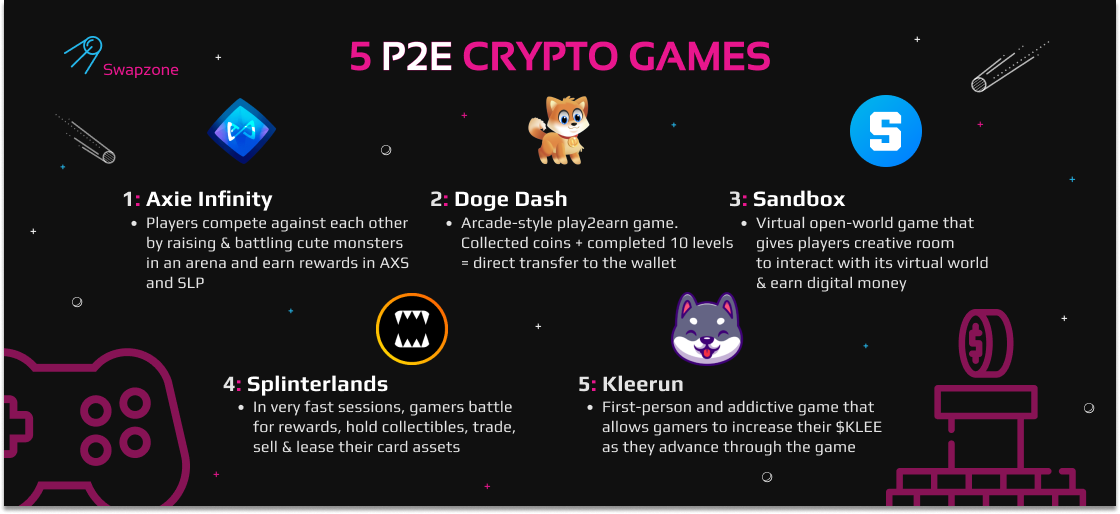Why Play-to-Earn Incentives Are Altering the Way You Play and Gain
The introduction of play-to-earn designs signifies a remarkable shift in the pc gaming landscape, inviting gamers to check out not just the enjoyment value of video games yet also their possible as income-generating systems. This paradigm supplies varied benefits, consisting of possession possession through blockchain modern technology, which fundamentally modifies player interaction and financial investment. Nevertheless, as this version evolves, it provides an unique set of difficulties that can impact its sustainability and charm. Comprehending these characteristics raises essential inquiries about the future of video gaming and the effects for both gamers and developers alike.
Introduction of Play-to-Earn Designs
Over the last few years, the video gaming market has seen a considerable improvement with the introduction of play-to-earn designs, essentially changing exactly how players engage with electronic settings. This cutting-edge technique enables players to acquire tangible rewards via their in-game tasks, producing a shift from conventional gaming standards where satisfaction and competitors were the primary motivations.
Play-to-earn versions utilize blockchain innovation and non-fungible tokens (NFTs) to provide players with possession of in-game possessions, which can be traded or offered for real-world money. Consequently, players are incentivized to invest effort and time into video games, promoting a sense of agency and economic chance. play to earn rewards. This shift has actually drawn in a diverse gamer base, including those that might have formerly seen gaming as a totally leisure activity
A number of platforms have actually emerged, showcasing effective applications of this model, such as Axie Infinity and Decentraland. These systems have not only generated considerable income yet likewise triggered discussions around the sustainability and values of such financial systems. As play-to-earn models remain to evolve, they guarantee to redefine the relationship in between players, designers, and the broader digital economic situation, paving the means for a new period in gaming.
Advantages for Players
As gamers involve with play-to-earn versions, they unlock a range of benefits that prolong past simple amusement. Unlike traditional gaming, where gamers spend time and cash without concrete returns, play-to-earn systems enable players to gain copyright or in-game properties that can be converted to real-world value.
Additionally, play-to-earn models promote community building amongst gamers. Players commonly work together to accomplish shared goals, therefore growing social links that enhance the overall experience. This sense of area can bring about participating gameplay, where players share techniques and resources, boosting both individual and group achievements.
Moreover, these versions can equalize access to gaming by permitting gamers from diverse financial histories to benefit monetarily. By getting involved in play-to-earn ecological communities, individuals can gain abilities and understanding about blockchain technology, more expanding their career possibilities in the blossoming digital economic situation. Eventually, the benefits for players extend well past gameplay, affecting their social, financial, and academic landscapes positively.
Difficulties in the Community
While the play-to-earn ecological community presents considerable possibilities, it is not without its challenges. Changes in worth can prevent possible gamers that seek steady income streams.
One more obstacle is the risk of scams and deceitful systems that can plague the environment. Gamers might encounter deceptive platforms guaranteeing high incentives yet inevitably causing economic loss. Guaranteeing count on and safety is crucial for the long-term practicality basics of play-to-earn designs.
Additionally, the ecological influence of blockchain pc gaming can not be forgotten. The power intake associated with mining and transaction processing raises ethical questions about sustainability. Game developers must find an equilibrium in between fulfilling gamers and decreasing eco-friendly impacts.
Finally, the regulative landscape is still progressing, presenting prospective risks for developers and gamers alike. Uncertain lawful structures can impede development and limit the development of play-to-earn ecological communities. Resolving these obstacles is necessary for recognizing the full potential of this transformative pc gaming paradigm.
The Role of Blockchain Technology
Blockchain modern technology functions as the backbone of the play-to-earn ecosystem, resolving a number of the challenges formerly detailed. By utilizing decentralized journals, blockchain makes sure transparency and security in deals. Players can with confidence make and trade in-game properties, understanding that ownership is proven and important site not subject to adjustment.

Tokenization of properties plays a vital role, approving players true possession of their in-game products, which can be bought, sold, or traded on different marketplaces. This motivates a vibrant additional market, where gamers can monetize their skills and time purchased the special info video game.
Furthermore, blockchain modern technology enables interoperability in between various games and platforms, permitting players to bring their properties throughout various environments. This flexibility not only improves customer experience but likewise advertises an extra comprehensive gaming atmosphere, inevitably improving the landscape of gaming and earning.
Future Patterns in Video Gaming
The pc gaming industry is on the brink of a transformative development, driven by arising modern technologies and shifting player expectations. As play-to-earn designs gain grip, gamers are significantly looking for immersive experiences that mix entertainment with concrete benefits. This shift is triggering programmers to introduce, concentrating on developing interesting gameplay that fosters community and interaction.
One notable trend is the integration of virtual reality (VR) and enhanced reality (AR), enhancing the gaming experience by offering deeper immersion and interactive environments. Additionally, advancements in synthetic intelligence are enabling more innovative non-player personalities (NPCs) and flexible gameplay, customizing experiences to private player preferences.

Final Thought
Finally, the play-to-earn version is considerably transforming the pc gaming landscape by making it possible for gamers to derive real-world worth from their in-game tasks. This paradigm change not just improves gamer involvement and investment but additionally increases challenges that must be resolved to guarantee sustainability within the ecosystem. As blockchain modern technology proceeds to facilitate possession of digital properties, the future of video gaming promises more development and opportunities for gamers across varied backgrounds.